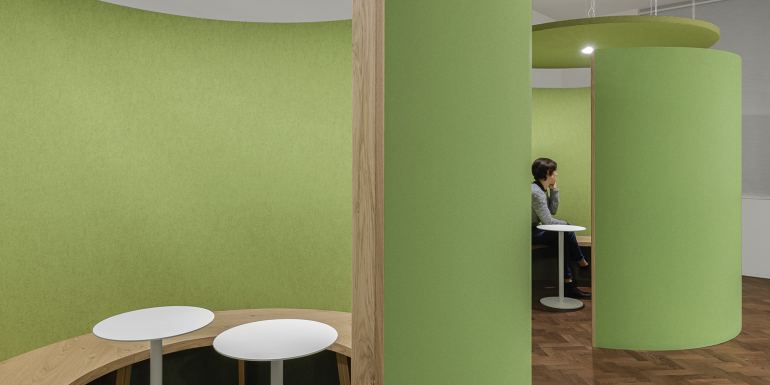Noisy offices 'lower productivity'

Oscar Acoustics’ study says noisy offices lower productivity, especially for women, and that employers should prioritise employee wellbeing
The UK has seen fewer workers return to the office full-time than in any other European nation. The reasons for this can vary, from employers wanting to make the most of lower overheads by downsizing offices, to workers being reluctant to return to daily commutes and feeling more productive surrounded by home comforts. For those who have returned to the office after lockdown working, there’s one element that has been thrown into sharp relief – noise.
A poll of 2,000 UK office workers showed that only 8% worked in a quiet office and only a quarter worked in a space well designed for their job. The sounds most likely to stop people from working effectively were colleagues talking to each other (38%); other people on calls (34%); colleagues eating (21%); and co-workers singing or humming (19%).
Four in ten office workers said poor acoustics interrupted their concentration; a third said their mood was negatively affected, while a quarter reported stress induced by high noise levels. Workers reported snapping at colleagues (17%) and at their bosses (12%), raising grievances (16%) and leaving passive-aggressive notes (11%) due to noise stress. One in ten had even resorted to physical violence (one in five of the gen Z demographic) to stop the noise issues. Most had tried to solve the issue by working from home (21%), moving desks (17%) or wearing headphones (23%).
Health issues
High levels of excessive noise can cause permanent health damage. The World Health Organization (WHO) states that excess noise is harmful to health. When asked, only a third of UK workers associated excessive noise with hearing loss and high blood pressure, and just one in seven understood that it could lead to diabetes, stroke, heart disease and heart attacks. 15% of UK office workers said that their workplaces had damaged their hearing. A fifth said it led to disturbed sleep and a quarter reported stress due to noise levels in their office.
You’d expect bosses to take things seriously and most agreed that companies had made some adjustments to the office environment, with only a third saying that nothing had been done. Common adaptations included installing physical barriers (26%) and soundproofing (21%), training for noisy people (25%) and implementing quiet zones (25%). Other adjustments included moving a loud team (18%). One in seven workers said their boss had fired someone for being too noisy.
Suffering in silence
Interestingly, the same survey found that women working in noisy offices are more likely than male colleagues to resort to home working instead of reporting disruptive behaviour. Nearly a quarter (24%) of female office workers across the UK chose to work from home to escape excessive workplace noise, compared to just over a fifth (21%) of men. 43% of women said they had difficulty concentrating in high-volume workplaces compared with 32% of men, though this could be down to men not feeling comfortable making that admission.
Female office workers were also found to be far less likely to make a formal complaint about a noisy colleague, with just 11% confirming they had done so previously compared to nearly a fifth (19%) of men.
Instead, nearly a quarter (23%) of women said they have previously felt compelled to either begin work late or come in early to catch up on work due to being distracted by workplace noise. By comparison, less than a fifth of men (19%) had done the same. The research also found that women were generally more prone to suffering the negative side effects of workplace noise pollution, interruptions by colleagues and distracting co-workers. Some 29% of female office workers said excessive noise in the workplace had caused them stress, while less than a quarter (24%) of men said the same. Both men and women cited ‘colleagues talking to each other’, ‘colleagues talking on the phone or video calls’ and ‘eating noises’ as among their top audible annoyances.
The study comes as businesses struggle to encourage staff back into the office, with occupancy rates plateauing. The report forms part of a white paper published by Oscar Acoustics, which aims to drive awareness of the benefits of ensuring workplaces are designed with acoustics in mind.
Ben Hancock, Managing Director at Oscar Acoustics, said: “Employers are facing real challenges around staffing and needing to achieve the same results with fewer people. With the take up of hybrid working, we’re seeing the impact [noise] can have on staff and productivity, creating unwanted distractions that reduce the quality of work. We need to take a long hard look at the suitability of our offices and understand that excessive noise is one of the main reasons why people aren’t returning. Without better acoustic management, this reluctance will continue, affecting company profits and staff morale.”
Download Oscar Acoustics’ white paper Noise Annoys at bit.ly/OA_whitepaper









